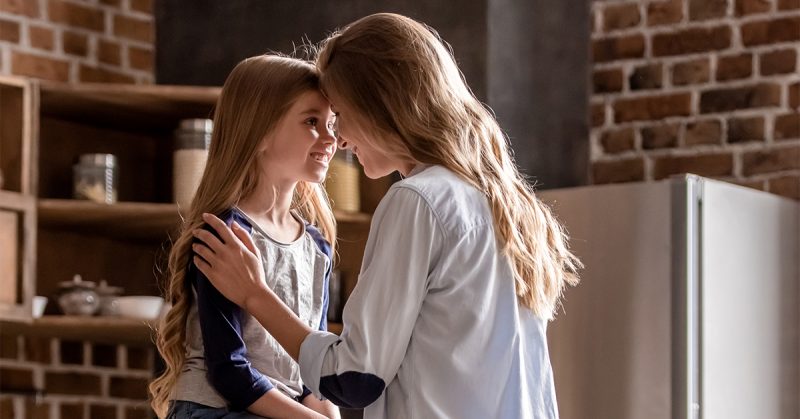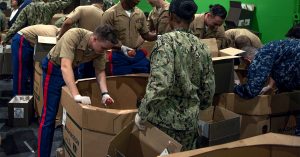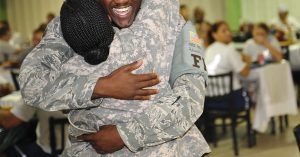Talking to a counselor can be a helpful way to work through the challenges of military life. However, finding a counselor who’s a good fit can be difficult, and knowing what to say during sessions can sometimes feel uncomfortable. Military OneSource has found a way to ease this process through their new specialty consultations, called “Building Healthy Relationships.” Like all counseling offered through Military OneSource, the sessions are free to service members and their families. The difference is that it is now easier to sign up, you get a counselor tailored for your area of support and all the sessions take place over the phone or by video.
I recently had the opportunity to enroll in the track called, “Healthy Parent-Child Connections.” There are currently six different relationship track options, each tailored for various military life situations. I wanted to see if the sessions could help me and my military kids adjust to major life changes that happened earlier this year. I’m proud to say that after two months, I am now seeing tremendous changes and improvements—not only in the way I run my household, but also in the way I see and talk to my kids.
Signing up for a Building Healthy Relationships specialty consultation was very user-friendly. I went to the Military OneSource website, looked at the relationship track options, and then began a live chat with a representative. Within a few minutes, they had learned a little about me, matched me to a counselor and scheduled the first session. Each session was a one-on-one phone call between the counselor and me. The calls were about two weeks apart, but each one was customized to our schedules. They also send email reminders before each call, which helped me to remember when they were. The process felt very simple and comfortable, and I liked having the same counselor each time. I appreciated her flexibility with my schedule, and it felt like she really cared about our sessions.
Each track in the Building Healthy Relationships program is six sessions long. During our first session, the counselor took some time to explain the process, so I knew what to expect. She said it was more like coaching than counseling, because the tracks are designed to help you focus on solutions to your current struggles. They use a GROW model, based on discussing Goals, Reality, Options and Willpower. She then listened while I explained some of the negative behavior I was experiencing with my kids, as well as my goals for the sessions. To clarify my reasons for seeking a counselor, I discussed the PCS move that had taken place a few months earlier. I knew that the kids’ behavior problems were connected to the move, but I hadn’t quite thought through the direct causes. My counselor really helped shed light on some of the reasons and emotions behind their behavior, which gave me hope that it was something we could all work through together.
During the second and third sessions, we focused on options and willpower to move forward. The counselor always began by asking what changes or improvements I had seen since our last call, and there were usually a mixture of good moments and frustrating ones. She would ask me to imagine a more ideal situation, and then discuss steps to get there. These sessions were helpful in several ways. First, as a parent, it is refreshing to share your parenting struggles with someone who will listen non-judgmentally. The counselor always listened to my experiences, and never told me I was wrong. Instead, she would help me to see things from my child’s perspective, or she would explain why the child’s behavior was typical for their age. She also helped me see the big picture of my priorities, and constantly encouraged me to come up with small, simple solutions that I could use throughout the day. We focused on recognizing when I was stuck in a rut of negative behavior cycles, and then finding ways to make small changes and shifts that would move us in the right direction. Finally, in between sessions, she would send me websites or documents that discussed situations I had brought up in counseling. While they weren’t all perfectly suited to my situation, there were several good ideas in the articles.
During the fourth session, I had a breakthrough. There had been several times when she asked me how I handled behavior problems in the past. Since I have four kids, I had developed numerous strategies and had used several military resources during deployments. The problem was that we had stopped using those resources after deployment and had never implemented discipline strategies after our recent PCS. I didn’t realize what long-term effects those life events were having on our family. For me, those routines and strategies were developed during a time of extreme stress. I didn’t want to go back to them because they reminded me of being in survival mode. Now that deployment was over, I wanted things to be easier automatically. But she reminded me that those parenting tricks I had learned during times of stress were still valuable. I needed to have the courage to go back to the coping strategies we had used in the past. Hanging a chore chart in the house helped us all stay on task. I needed to remind myself of the strategies I used to stay calm during deployment and continue to implement those practices regularly.
By the final session, I had noticed some real changes in my routines. I was taking steps to reduce my own stress levels by going to bed earlier, getting up earlier and doing work during set time limits throughout the day. I was working to improve my work/life balance, which helped me be more present with my kids. The changes I was making helped the kids change as well. When I was more sympathetic to what they were going through in the aftermath of a PCS move and a deployment, I was better able to relate to their behavior changes. Once I saw things from their perspective and made the effort to listen more, we were able to connect on a new level and strengthen our relationship.
The best lesson that I took from the Healthy Parent-Child Connections track was cultivating confidence in my abilities to connect with my kids. Instead of feeling frustrated and defeated like I did before we started the sessions, I now felt that I had options for communication. If I didn’t like how things were going, I felt like I had the confidence and the tools to take things in a better direction.
Relationship coaching is never a one-and-done experience. I’m aware that there will always be growth, changes and room for improvement. But, I’m so grateful to Military One Source for providing these Relationship Tracks to help families through some of the common challenges of military life. Building Healthy Relationships made a significant difference in my family, and I believe it can help yours too.





